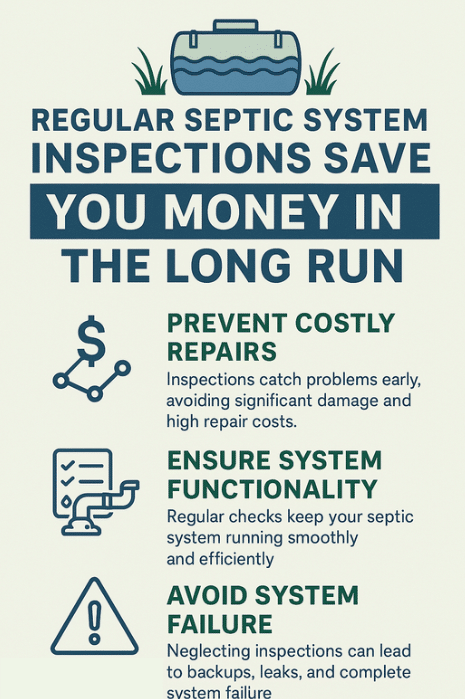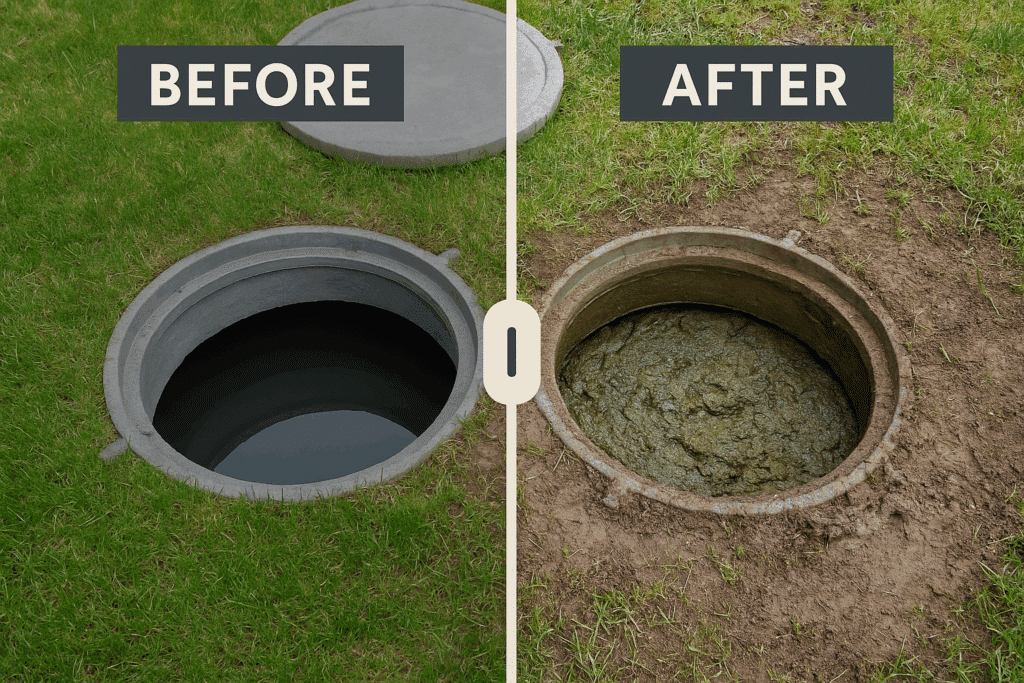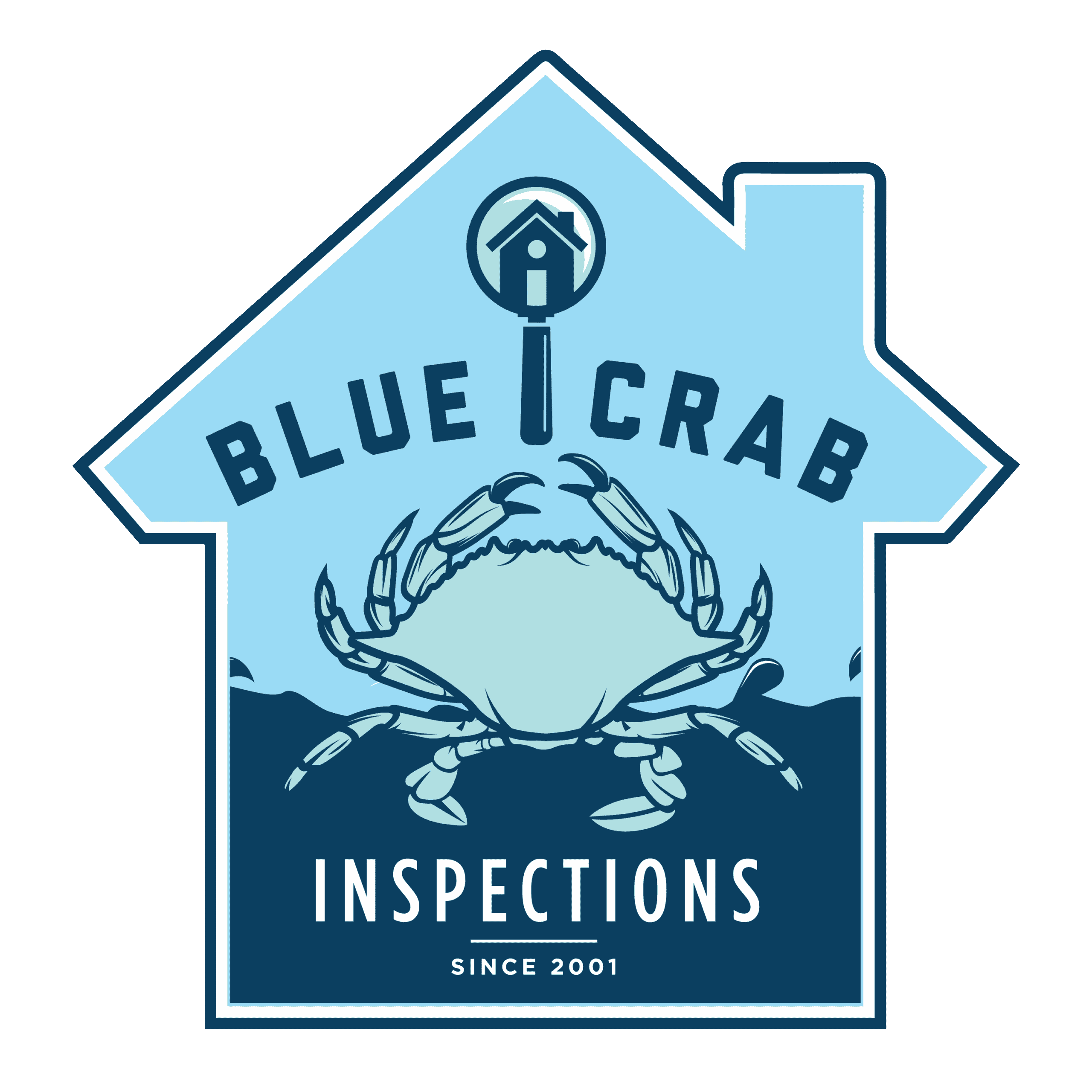
The Hidden System That Can Cost You Thousands, Unless You Catch Issues Early
For many homeowners, the septic system is “out of sight, out of mind.” However, neglecting regular inspections can turn your peaceful backyard into a financial nightmare. From foul odors to flooded drain fields, a failing septic system can cost thousands in repairs or, even worse, require total replacement.
We help homeowners avoid these surprises by keeping septic systems running smoothly and safely. Let’s explore why routine septic inspections are essential and how they can actually save you money over time
What Is a Septic System?
Your septic system is an underground wastewater treatment setup. It is essentially a self-contained sewage solution that handles everything that goes down your toilets, sinks, and showers.
A standard system includes:
- Septic tank – Separates solids and liquids
- Drain field – Disperses treated liquid into the soil
- Pipes and risers – Transport and access waste for pumping or inspection
When it is working correctly, you barely notice it. When it is not, you will notice very quickly
The Real Cost of Skipping Septic Inspections

Think skipping your inspection will save you time and money? Think again.
Here is what you risk:
Expensive Repairs
- A clogged or failing system can lead to repairs or replacements costing thousands of dollars.
- Backups inside your home can damage flooring, drywall, and belongings.
Health Hazards
- Untreated waste can seep into your yard or, worse, your drinking water supply.
- Exposure to sewage can cause serious illness in pets and people.
Property Value Damage
- If you plan to sell your home, an unmaintained septic system can significantly reduce your property value or even derail the sale entirely.
Preventive inspections cost a fraction of emergency repairs.
What Happens During a Septic Inspection?
At Blue Crab Inspections, we offer detailed septic system assessments that go beyond a surface check.
Here is what we examine:
- Tank Condition: We look for cracks, corrosion, and sludge levels.
- Water Flow: We check for slow drains or backflow, which are signs of overload.
- Drain Field Health: We identify signs of flooding, odors, or soggy spots.
- Component Function: We test the baffles, filters, and risers.
- Pump System (if applicable): We assess float switches and alarms.
You will receive a clear, photo-supported report with professional guidance on what to fix, maintain, or monitor.
How Often Should You Schedule a Septic Inspection?
- Every 3 years for homes with standard gravity-fed systems
- Annually for homes with pumps, electrical components, or high water usage
- Before buying or selling a home, which is a must during the due diligence period
How Inspections Save You Money
Regular inspections provide several financial benefits:
- No surprise emergency repairs
- Catch small problems before they grow
- Extend the lifespan of your system
- Keep pumping costs low by preventing tank overload
- Peace of mind for you, your family, and your future buyers
Why Choose Blue Crab Inspections?
We are not just checking a box. We are protecting your home.
Here is what sets our septic inspections apart:
- ✅ Licensed, InterNACHI-certified inspectors
- 📷 Visual, easy-to-read reports with repair guidance
- 🧰 On-site expertise and honest recommendations
- 🕒 Fast turnaround and local service you can trust
Explore all of our home and specialty inspection services here
Do Not Wait for a Backup to Inspect Your Septic System
A healthy septic system is one you never have to think about. Let us help you keep it that way.
🔍 Schedule a septic inspection with Blue Crab Inspections today.
Call (443) 539-8242 or Book Online Here
Having Mosquito Problems? Visit Black Tie Termite and Pest Control and see how we can help you!

